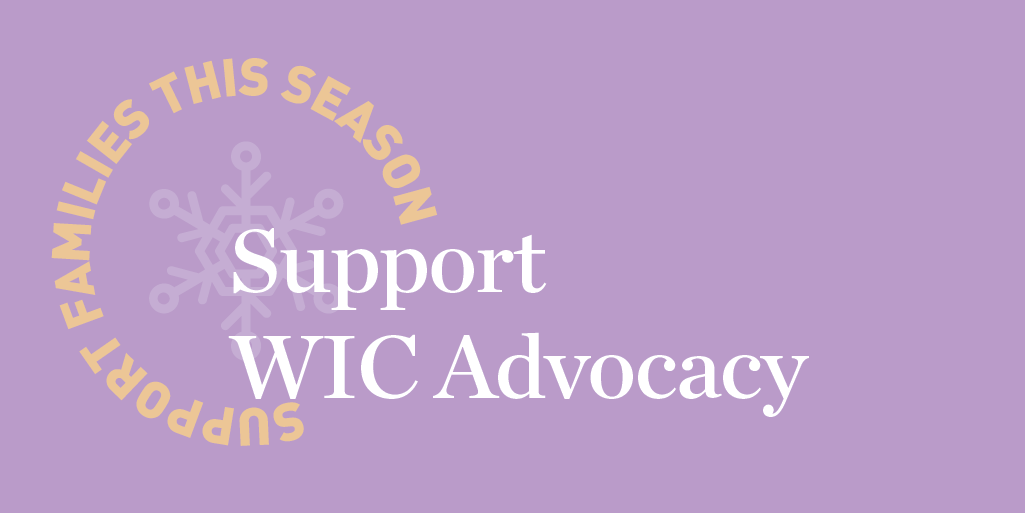 This is a giving season like no other in recent memory. COVID-19 has transformed our nation’s way of life. Many families have been hard hit by both the virus and the economic impacts of the virus. The need for a helping hand is great. But just as we’ve seen the struggles our country is enduring, we’ve also seen an extraordinary resilience. We are so heartened by how the WIC community has risen to support WIC participants and one another.
This is a giving season like no other in recent memory. COVID-19 has transformed our nation’s way of life. Many families have been hard hit by both the virus and the economic impacts of the virus. The need for a helping hand is great. But just as we’ve seen the struggles our country is enduring, we’ve also seen an extraordinary resilience. We are so heartened by how the WIC community has risen to support WIC participants and one another.
Throughout December, we will highlight the extraordinary work of the WIC Community and the National WIC Association (NWA), from how we’ve responded to COVID, to the nutrition and breastfeeding support we’ve seen, to our advocacy efforts for a stronger future for WIC. This week's theme is Support WIC Advocacy.
This work is made possible by people like you. We hope you’ll consider donating today to ensure we can continue building a bright future for WIC families.
The United States has unconscionably high rates of maternal mortality, driven by persistent racial disparities. Black women are at least three times as likely and Indigenous women at least twice as likely to die of pregnancy-related complications as white women. WIC’s effective nutrition intervention, delivering targeted support that addresses chronic diet-related conditions, positively impacts pregnancy and birth outcomes. Recognizing WIC’s unique position at the intersection of food access and public health, the National WIC Association has advocated for WIC to be integrated into comprehensive measures to reduce the risk of maternal mortality and resolve racial disparities in maternal health.
In 2019, Reps. Alma Adams (D-NC) and Lauren Underwood (D-IL) co-founded the Black Maternal Health Caucus. NWA worked with the Caucus and its main champion in the Senate, Sen. Kamala Harris (D-CA), to identify policy proposals to close the maternal health gap for Black and Indigenous women. The Black Maternal Health Momnibus Act of 2020 provides comprehensive reforms to create a safer pregnancy and birthing experience for Black and Indigenous women.
NWA ensured that WIC is included in that legislation. As a result, the Momnibus would extend postpartum eligibility for WIC participants to two years — extending vital support to ensure adequate nutrition before subsequent pregnancies. The Momnibus would also ensure culturally congruent care in the WIC workforce, both by providing anti-racism and implicit bias training for WIC providers and diversifying the educational pipeline to WIC-aligned professions, including dietetics, nutrition, and lactation counseling.
This past September, the House of Representatives passed the Pregnant Workers Fairness Act, critical legislation that establishes workplace accommodations for pregnant workers. For years, NWA has advocated for this bill from a maternal health perspective, recognizing that workplace factors — like prolonged standing or heavy lifting — could pose risks to pregnancy and birth outcomes. Pregnant workers should not have to choose between the health of their pregnancy or livelihood. NWA engaged local WIC providers to educate policymakers about this dynamic, which laid the groundwork for the September vote and built momentum for legislative action in 2021.
NWA’s legislative, regulatory, and policy efforts aim to integrate a health equity* lens into all WIC-related advocacy efforts. The United States cannot deliver on the promise of a healthy start for every child without addressing the significant racial disparities, driven by a history of institutional racism and abusive medical practices. NWA partners with WIC providers nationwide to acknowledge these truths and fight for a more just and equitable healthcare system that prioritizes healthy pregnancy and birth outcomes.
*NWA Health Equity Statement: Health equity is the ability of all individuals and families to achieve optimal health, irrespective of their identity, race, ability, or class. This requires equitable access to nutritious foods, breastfeeding support, chronic disease prevention and management services, safe living environments, and good jobs with fair pay. It necessitates removing obstacles to families’ short- and long-term health and wellbeing including poverty, discrimination, and institutional racism, and other forms of bias expressed through housing, healthcare, education, labor, and other public policies.